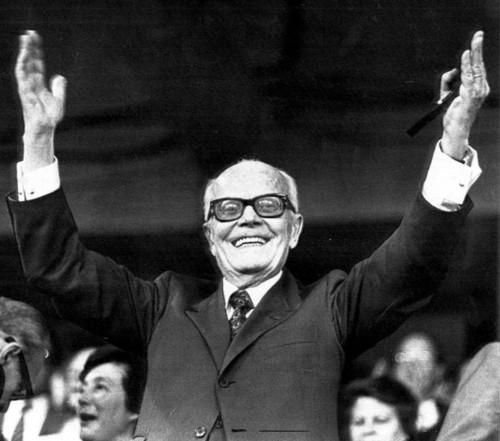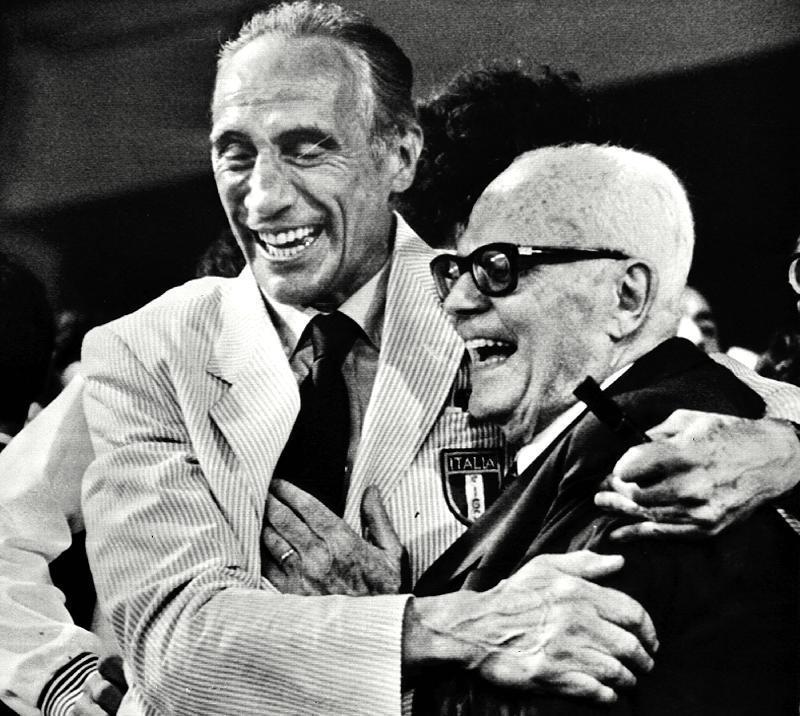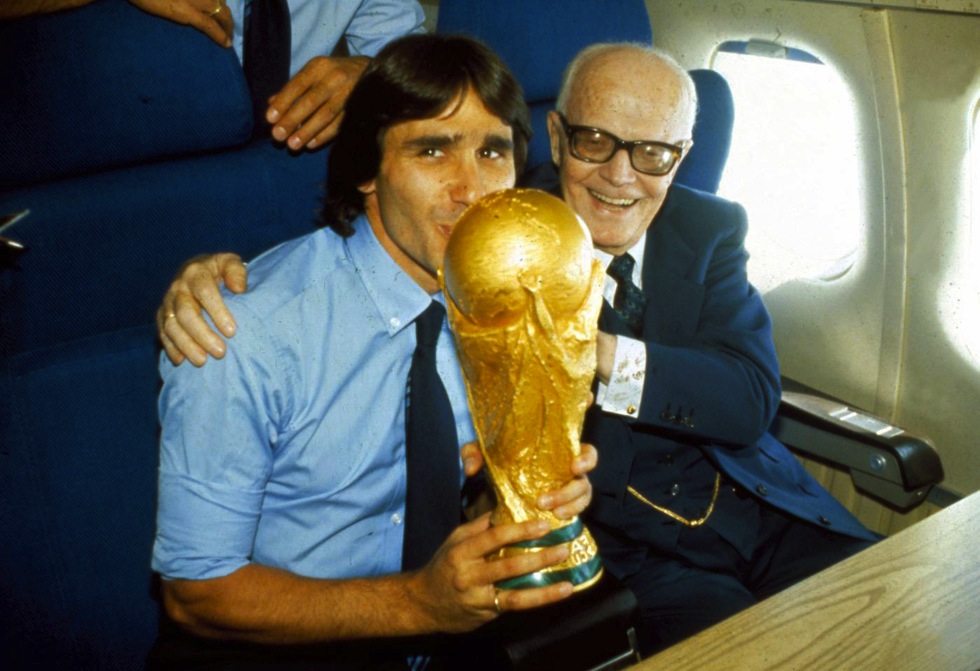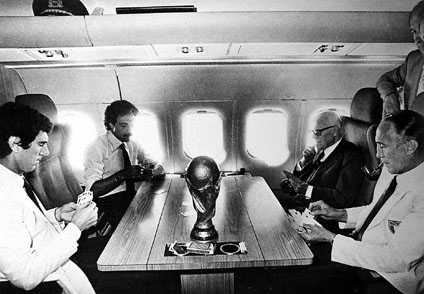<Back to Index>
- 7th President of Italy Alessandro (Sandro) Pertini, 1896
PAGE SPONSOR
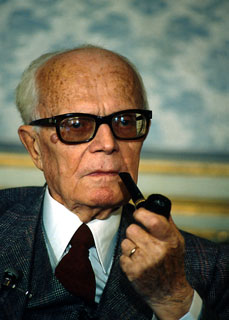
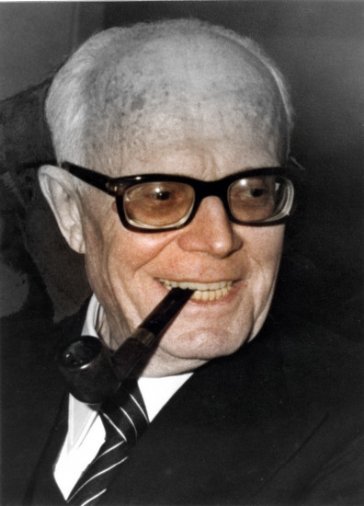
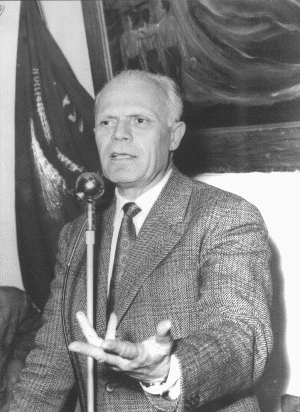
Alessandro (Sandro) Pertini (September 25, 1896 - February 24, 1990) was an Italian journalist and socialist politician, who served as the seventh President of the Italian Republic, from 1978 to 1985.
Born in Stella (Province of Savona) as the son of a well to do landowner, Alberto, he studied at a Salesian college in Varazze, and completed his schooling at the "Chiabrera" lyceum (high school) in Savona.
His philosophy teacher was Adelchi Baratono, a reformist socialist who contributed to his approach to Socialism and probably introduced him to the inner circles of the Ligurian labor movements. Pertini obtained a Law degree from the University of Genoa.
Sandro Pertini was against Italy's participation in World
War I, but served as a lieutenant and was awarded several
medals as for bravery. In 1918 he joined the United
Socialist Party, PSU, then he settled in Florence where he
also graduated in political science with a thesis entitled
La Cooperazione ("Cooperation"; 1924). While in the
city, Pertini also came into contact with people such as
Gaetano Salvemini, the brothers Carlo and Nello Rosselli,
and Ernesto Rossi. Pertini was physically beaten by
Fascist squads on several occasions, but never lost faith
in his ideals.
After the assassination of PSU leader Giacomo Matteotti by Fascists, Pertini became even more committed to the struggle against the totalitarian regime. In 1926, he was sentenced to internment, but managed to go into hiding. Later, together with Carlo Rosselli and Ferruccio Parri, he organized and accompanied the escape to France of Filippo Turati, who was the most prominent figure of the PSU. Pertini remained in the country until 1926 working as a mason. On his return to Italy, he was arrested in Pisa and sentenced to ten years' imprisonment.
In 1935 he was interned on Santo Stefano Island,
Ventotene (LT), Pontine Islands, an island in the
Tyrrhenian Sea, where he remained through Italy's entry
into World War II and until 1943. There he saved the
famous diaries of Antonio Gramsci. Although he had begun
suffering from severe illness, Pertini never demanded
pardon. He was released a month after Benito Mussolini's
arrest, and joined the Italian resistance movement against
the Nazi German occupiers and Mussolini's new regime - the
Italian Social Republic. Arrested by the Germans, he was
sentenced to death but freed by a partisan raid. Pertini
then traveled north to organize partisan war as an
executive member of PSU (alongside Rodolfo
Morandi and Lelio Basso).
After the war ended in Italy on 25 April 1945 and the monarchy was abolished through the Italian constitutional referendum, 1946, Pertini was elected to the Constituent Assembly (La Costituente), the body that prepared the new republican Italian Constitution. In the postwar era he was a prominent member of the directive board of the Italian Socialist Party (the PSI, which the PSU had rejoined).
In spite of his intransigent attitude toward the Italian Communist Party, Pertini was suspicious of many policies enforced by the PSI. He criticized all forms of colonialism, as well as corruption in the Italian state and within the socialist party, where he kept an independent political position.
He was appointed president of the Italian Chamber of Deputies
in 1968, and in 1978 President
of the Italian Republic, the highest office in
the Republic. As President he succeeded in regaining the
public's trust in the State and institutions. During the Brigate Rosse terrorism
period of the Anni di piombo, Pertini was a
defender of the institutions he represented. His death in
Rome was viewed by many as a national tragedy, and he is
arguably one of modern Italy's most accomplished
politicians. In December 1988 Pertini was the first person
to be awarded with the highly regarded Otto Hahn Peace
Medal in Gold by the United Nations Association of Germany
(Deutsche Gesellschaft für die Vereinten Nationen, DGVN)
in Berlin, "for outstanding services to peace and
international understanding, especially for his
political ethics and practical humanity."
What does today's Resistance consist of? For this I plead with young people: defend our hard won positions! Defend the Republic and democracy! What I mean is today we need two qualities, my dear friends: honesty and courage. I appeal to young people: be honest first of all, politics must be done with clean hands! If there's any scandal, if anyone plays politics for his own vile interest, he must be reported without hesitation!
—Sandro Pertini
Young people do not need to preach, young people need, from the elders, examples of honesty, consistency and altruism.
— Sandro Pertini, Television message to Italians, December 31, 1978
President Pertini of Italy arrived - 1st visit to U.S. He's 84 and a terrific old gentleman. We had the full ceremony under a warm sum. Good meeting. He loves America - very touching moment on the way into the White House. He paused by the Marine holding our flag and kissed it.
—Ronald Reagan, 1982
Pertini attended the 1982 World Cup Final in Madrid for
the match between Italy and West Germany just two days
after the fourth anniversary of his inauguration. After
Italy scored their third goal, he wagged his finger to
either the German delegation or King
Juan Carlos I, and probably said "they [the German
team] will not catch us any more".
Paolo Rossi, Italy's and the tournament's top scorer,
later said: "I remember that when he welcomed us at
the Presidential Palace after our win, he rose and said:
'This is my best day as President.'"
